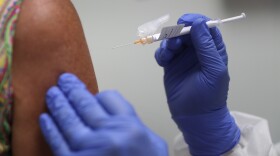
Jane Greenhalgh
Jane Greenhalgh is a senior producer and editor on NPR's Science Desk.
She produces the weekly Health segment on NPR's Morning Edition and writes and edits for NPR's health blog, "Shots." Greenhalgh also produces stories on science, health, and global health across NPR's many platforms.
Greenhalgh was part of the team of broadcast, digital, and multimedia journalists who produced the 2015 award-winning series "#15Girls," which examined the struggles teenage girls face throughout the developing world. Greenhalgh's story "Banished to the Shed" was one of NPR's most listened to and viewed stories of 2015.
She has twice won The American Association for the Advancement of Science award: In 2020 for her work on Victoria's Story: Gene editing helps people with sickle cell, and for NPR's 2014 series "The human microbiome: guts and glory." Greenhalgh also won The National Academies of Science Communication award in 2014, and she was part of the digital team which won for the 2009 series Climate Connections. She traveled extensively for this year-long, multi-platform project, examining how climate change is affecting people across the globe. From Timbuktu, where the desert nomads are giving up their way of life, to Peru, where potato farmers are moving their crops higher up the mountain, and to Bangladesh, where scientists are experimenting with drought and flood resistant rice, the stories Greenhalgh produced chronicled the impact of climate change.
Greenhalgh has traveled extensively covering health issues in developing countries, including cholera in Haiti, polio in Indonesia, tuberculosis in Kenya, AIDS in India, malaria in the Gambia, malnutrition in Bolivia, and menstrual health in Nepal.
-
Much of the Northeast U.S. is blanketed in a murky haze of wildfire smoke. For most people breathing this air is unpleasant, for others it can be life-threatening. There are ways to reduce the risk.
-
Toxic metal can be harmful to developing brains. New lead targets are part of a broad FDA imitative to reduce children's exposure to the lowest levels possible.
-
Health officials argue the protection of the COVID vaccine booster wanes over time and say some people need a second booster. But other infectious disease experts say three shots are enough for now.
-
People who are 50 and older and certain immunocompromised individuals may get a second Pfizer-BioNTech or Moderna COVID-19 vaccine booster four months after they received the first.
-
Kids ages 5 to 11 will soon be able to get Pfizer's low-dose COVID vaccine. CDC director Rochelle Walensky agreed with a unanimous decision of a team of advisers that the benefits outweigh the risks.
-
People with weakened immune systems who already got two doses of the Pfizer or Moderna COVID-19 vaccines can now get a third shot. But exactly who is eligible? Here's what we know so far.
-
The FDA amended its emergency use authorizations for the Pfizer and Moderna vaccines to allow for an additional dose for some immunocompromised people.
-
The CDC information dated Thursday gives new details on this variant of the coronavirus and says the agency should "acknowledge that the war has changed." It was first reported by The Washington Post.
-
The CDC says COVID-19 was the largest factor, along with drug overdoses, homicides, diabetes and chronic liver disease. The decline was even greater for Hispanic men.
-
Not only does the new research show the Moderna and Pfizer vaccines are effective at protecting pregnant people, it also found that antibodies were present in umbilical cord blood and breast milk.









